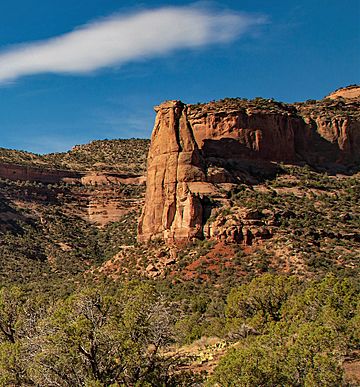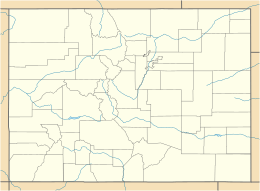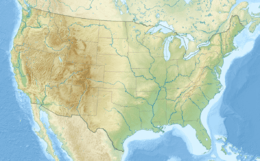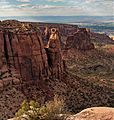Grand View Spire facts for kids
Quick facts for kids Grand View Spire |
|
|---|---|

East aspect
|
|
| Highest point | |
| Elevation | 5,821 ft (1,774 m) |
| Prominence | 161 ft (49 m) |
| Isolation | 2.21 mi (3.56 km) |
| Parent peak | Black Ridge |
| Geography | |
| Location | Colorado National Monument Mesa County, Colorado, U.S. |
| Parent range | Colorado Plateau Uncompahgre Plateau |
| Topo map | USGS Colorado National Monument |
| Geology | |
| Age of rock | Late Triassic to Early Jurassic |
| Type of rock | Wingate Sandstone |
| Climbing | |
| First ascent | 1961 |
| Easiest route | class 5.8 A2 climbing |
Grand View Spire is a tall, thin rock formation called a sandstone pillar. It stands 5,821 feet (1,774 meters) high. You can find it in the Colorado National Monument in western Colorado, USA. This amazing 400-foot tower is on the west side of Monument Canyon. It's about one mile southeast of the monument's visitor center. The spire is also nine miles west of Grand Junction. It sits near other famous rock formations like Independence Monument and Kissing Couple. Its name comes from its spot at the tip of Grand View Overlook. This is one of many beautiful viewpoints along Rim Rock Drive.
Contents
What is Grand View Spire Made Of?
Grand View Spire is mostly made of a type of rock called Wingate Sandstone. This sandstone formed from ancient sand dunes about 200 million years ago. Imagine huge deserts with strong winds! These winds blew sand into giant dunes. Over time, the sand turned into rock.
The very top of the spire has a harder rock layer. This layer is called the Kayenta Formation. It formed from sand carried by rivers. The ground around the bottom of the spire is made of Chinle Formation rock. Even older rocks, like gneiss and granite, are found at the bottom of the canyon. These are called Precambrian basement rock. Any rain that falls on Grand View Spire flows into the Colorado River.
Weather at Grand View Spire
Grand View Spire is in a semi-arid climate zone. This means it's usually dry. Summers are hot, and winters are cold with some snow. Temperatures can reach 100°F (38°C) on a few days each year. They often get to 90°F (32°C) for many days. It stays at or below freezing for about 13 days a year. The best time to visit is from April through October. The weather is usually very pleasant then.
Climbing Grand View Spire
People have been climbing Grand View Spire for many years. The first successful climb happened in 1961. There are a few different paths, or "routes," that climbers use. Here are two well-known climbing routes:
- Southwest Defile Route – This route is rated class 5.8 C2. It takes three sections, or "pitches," to climb. John Auld, John Kuglin, and Gary Ziegler were the first to climb this route in 1961.
- Relics – This route is rated class 5.10. It takes five pitches to climb. Mike Baker, Michael Kennedy, and Bob Wade first climbed this route on November 13, 1991.
Gallery
 | Kyle Baker |
 | Joseph Yoakum |
 | Laura Wheeler Waring |
 | Henry Ossawa Tanner |






